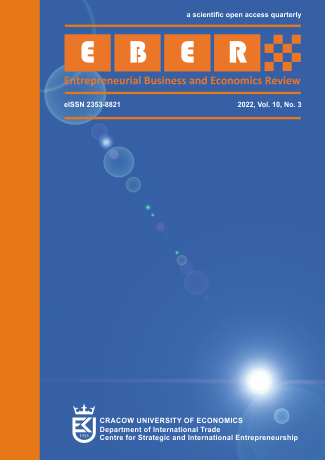The success factors of family and non-family firms:
Similarities and differences
The success factors of family and non-family firms:
Similarities and differences
Author(s): Robert Zajkowski, Krzysztof Safin, Elżbieta StańczykSubject(s): Business Economy / Management, Socio-Economic Research
Published by: Uniwersytet Ekonomiczny w Krakowie
Keywords: Family and non-family firms; success factors; success measures; success models; small and medium-sized enterprises; structural equation modelling;
Summary/Abstract: Objective: The aim of this article is to identify whether there are similarities or differences between family and non-family firms in terms of the factors which contribute to business success. More specifically, compari- son analyses were designed to isolate possible variations related to an enterprise’s advantage over its com- petitors, the internal and external relationships of the enterprise, intangible resources, and an enterprise’s financial resources.Research Design & Methods: The source for empirical data used herein is individual data selected from a country-wide survey conducted by Statistics Poland from December 2017 to January 2018. The survey was carried out electronically using an online questionnaire. Focusing on non-financial businesses with 10-249 em- ployees, it examined how entrepreneurs view the significance and impact of a group of factors on the devel- opment and success of their businesses, including a self-assessment of the firm’s current situation and devel- opment over the last three years. The sample consisted of 43,379 firms, of which 14,686 self-identified as having a family character. Unobservable (latent) variables were used for a more in-depth analysis: one repre- sented a component of enterprise success while the other four were characterised as success factors. An anal- ysis of the main components was used to identify independent variables (success factors) with the relation- ships between the variables examined through structural equation modelling.Findings: In the light of the findings, it is possible to show that family firms display partial differences in their rating of the factors that have impacted their success. For this group, aspects including how the firm is organ- ised, financial resource access, and the overall financial situation were less important in comparison to non- family ones. However, family firms showed no differences in their perception of the factors supporting their competitive advantage and their intangible resources.Implications & Recommendations: An ongoing debate has weighed whether family and non-family firms dif- fer in terms of performance and their internal perception of business success, and numerous studies present rather distinct visions. Some confirm the advantages of family businesses; others deny such benefits exist, and a final group notes no statistically significant evidence that would confirm differences between the two groups. In contrast, the results of our study provide evidence that Polish family businesses partly differ from non-family ones regarding the factors that influence their business success.Contribution & Value Added: Our study verifies whether family and non-family firms differ in terms of the factors that contribute to business success. We describe both business success and the factors that impact it as unobserved (latent) constructs. This approach is rare in the current literature; more often, success factors and measures are analysed separately. However, this approach allowed us to analyse the relationship in a more consistent and complex way.
Journal: Entrepreneurial Business and Economics Review
- Issue Year: 10/2022
- Issue No: 3
- Page Range: 51-72
- Page Count: 22
- Language: English

